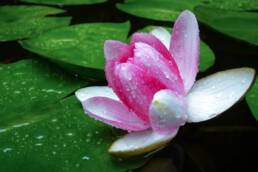Glossary
Lotus effect
The lotus effect, also known as the lotus effect, is the low wettability of a surface, as can be observed in the lotus plant. The microstructured top of the leaves of this plant cannot be wetted by water and many other aqueous liquids, so that drops form that do not adhere to the surface. Solids such as colored powder that adhere to common surfaces have a reduced hold and can simply be washed away. The lotus effect describes the self-cleaning of hierarchically structured surfaces in the interplay of low and reduced wettability interpersonal skills, Other plants, such as the nasturtium, cabbage, reed, columbine, tulip, lady's mantle and banana show this effect.
Self-cleaning surfaces are of increasing technical and economic importance.


